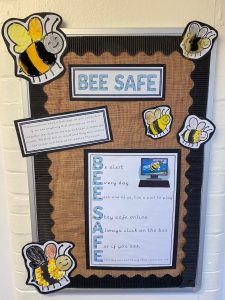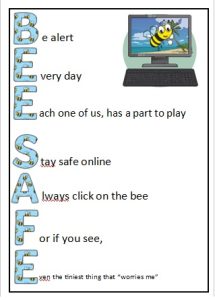Computing in the 21st Century is seen as an essential resource to support learning and teaching, as well as playing an important role in our everyday lives. Manland Primary School believes in the effective use of computing in order to arm our pupils with the skills to access life-long learning and employment. Whilst exciting and beneficial both in and out of the context of education, much computing, particularly web-based resources, is not consistently policed. We believe that our school community needs to be aware of the range of risks associated with the use of these Internet technologies. At Manland, we understand our responsibility to educate our pupils on internet safety issues; teaching them the appropriate behaviours and critical thinking skills to enable them to remain both safe and legal when using the internet and related technologies, in and beyond the context of the classroom.
- Online Safety Policy (374KB)

BeeSafe
At Manland, we have a bee logo on our computers. If we see anything that worries us on the computer, we click on the bee and then it locks the screen. We then tell an adult, and they will unlock the screen and help us to resolve the issue.
Safer Internet Day
This year, Safer Internet Day is the Tuesday 7th February 2023. Safer Internet Day is celebrated every year in approximately 180 countries worldwide! The aim of the day is to raise awareness of internet safety by promoting positive and responsible usage of it. It is a day to discuss how to look after yourself and others while staying safe in an online space and we will be doing this at Manland Primary School.
Each year, Safer Internet Day is based around a theme and this year’s theme is ‘Want to talk about it? Making space for conversations about life online.‘ This means our focus will be all about our behaviour online and how to stay safe when talking or interacting with others.
Useful websites
Set up parental controls:
Report a concern:
Find out more…
Top Tips
Below are some ideas for keeping your child safe online:-
- Be involved in their ‘online’ life. Talk with your child about what they are doing online, find out what websites they like. Encourage them to be open about what they are doing online. Encourage your child to choose sites that are age appropriate, fun and educational in order to develop their online skills. For example Scratch is an online coding websites that children can use for free.
- Be aware. Your child will grow up quickly and so too will their computing skills. Try to keep up to date with what they are doing online.
- Be clear about rules for using the Internet. Ensure your child knows what the rules are and encourage them to think about what is appropriate for them. Things to consider may include what they might see, what they share, who they talk to and how long they spend online. By instilling rules at a young age, children are better aware of the dangers they face online and how to protect themselves.
- Encourage children to use in the internet in a family space. This will help you to keep an eye on the sites your child is accessing and support them in making the right decisions.
- Be clear about what devices connect to the internet. Be aware that most mobile phones, tablets and iPads and gaming technologies all connect to the internet.
- Use parental controls on devices that link to the internet, such as the TV, laptops, computers, games consoles and mobile phones. As well as locking/blocking sites, parental controls can be used to help you set age appropriate limits as your child grows and develops.
- Be aware that even with parental controls and web filtering the internet can still pose different dangers.
Educate against Hate
Radicalisation and extremism are very important issues which Manland take very seriously in safeguarding against. Support at home in educating the children around these matters is also vital. A new website developed by the Home Office is now available for parents regarding these matters. It is a useful resource which will help you in understanding how you can help to protect your child against radicalisation and extremism. The website also contains useful information about keeping your child safe online and has links to the NSPCC, Childnet, Internet Matters and more. Please click on the link below:- www.educateagainsthate.com





